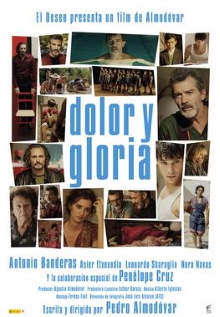Pedro Almodóvar directs this film that brings together some of the biggest name performers in the Spanish speaking world. I was dubious about it at first as the story of a renowned film director in decline being addicted to drugs seemed like just another entry in a tired genre. But it opens up to cover many more aspects of the director’s and I found that I quite liked it despite its lack of a singular focus.
Salvador Mallo is a renowned director in Madrid who has not worked for some years, being plagued by chronic pain and numerous health issues. A retrospective of one of his films put him back in touch with the actor who appeared in it, Alberto Crespo. It turns out that the two have not spoken in over 30 years as the director was upset with the actor’s performance. From him, Salvador learns how to smoke heroin which seems to help with his pain while Alberto discovers a memoir written by the director that he wants to turn into a one-man play. Flashbacks reveal the director’s childhood, of learning to sing but little else at the seminary and being brought up his poor mother. In the present, Alberto’s play unexpectedly brings Salvador back in touch with an old lover of his and drawing on this web of old connections to his past, Salvador is able to find the strength to move past his traumas and begin living again.
As I noted, I didn’t like this at first because it seemed like another story about an artist’s downward spiral exacerbated by a drug habit. However it turned out to have a broader set of themes than that, dealing with the director’s relationship with his mother, his early romantic feelings as a homosexual, his stubbornness as a director, and most of all the seemingly inevitable slow decay and pain of growing old. My wife didn’t like this as much as it doesn’t have a singular focus and isn’t even a biography of a real person. In my case, I quite liked it as its breadth of themes feel nicely balanced and I enjoyed the fact that this is ultimately a tale of redemption as he reconnects to people that he had thought he had lost forever. Alberto at first seems like a poor influence on him as he introduces him to heroin but Alberto actually demonstrates that he keeps his own habit under tight control and is far more enthusiastic about performing Salvador’s play. Similarly Salvador’s reunion with his old love is a positive force, their reminiscences serving to buoy them up and reaffirm their life choices while they are wise enough not to repeat old mistakes. It’s so good to see this as a film that captures an artist at his lowest and then turns it around.
We’ve watched other films by Pedro Almodóvar before and all of them all evince the same style in that they’re not about just one thing but cover the many disparate events and connections that make up people’s lives. I haven’t always been kind in my past posts about them and I suspect that how much individuals like each of them would depend on how much they can relate to the characters in each film. I also feel that this film certainly looks more beautiful and boasts significantly better production values than his previous work. Salvador’s childhood home in the cave looks positively enchanting after it was been whitewashed and decorated and the scene of the male adult student washing himself is more sensuous than anything I can recall. This one has serious star power as well as Antonio Banderas and Penélope Cruz are probably the biggests stars in the Spanish-speaking roles though it is amusing that they don’t actually have any scenes together here.
Overall I liked this more than I thought I would and I loved that the narrative wasn’t solely dominated by the main character becoming addicted to drugs. I also like the underlying message that if you are sick, please go get proper treatment from a doctor!
